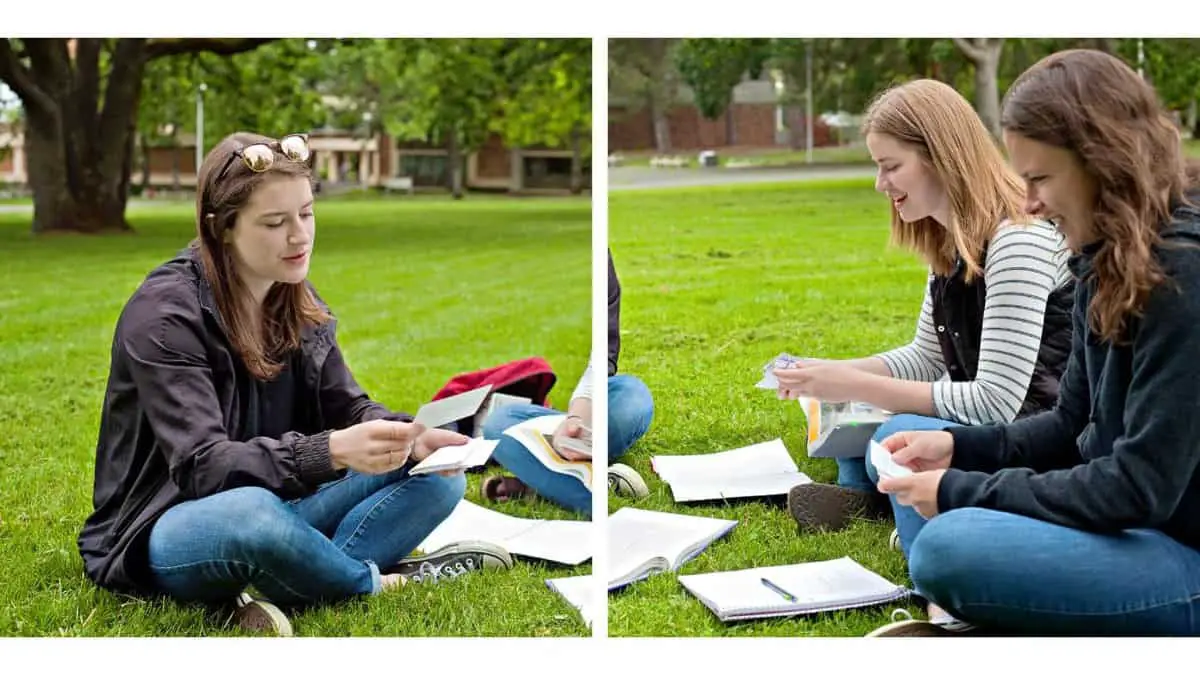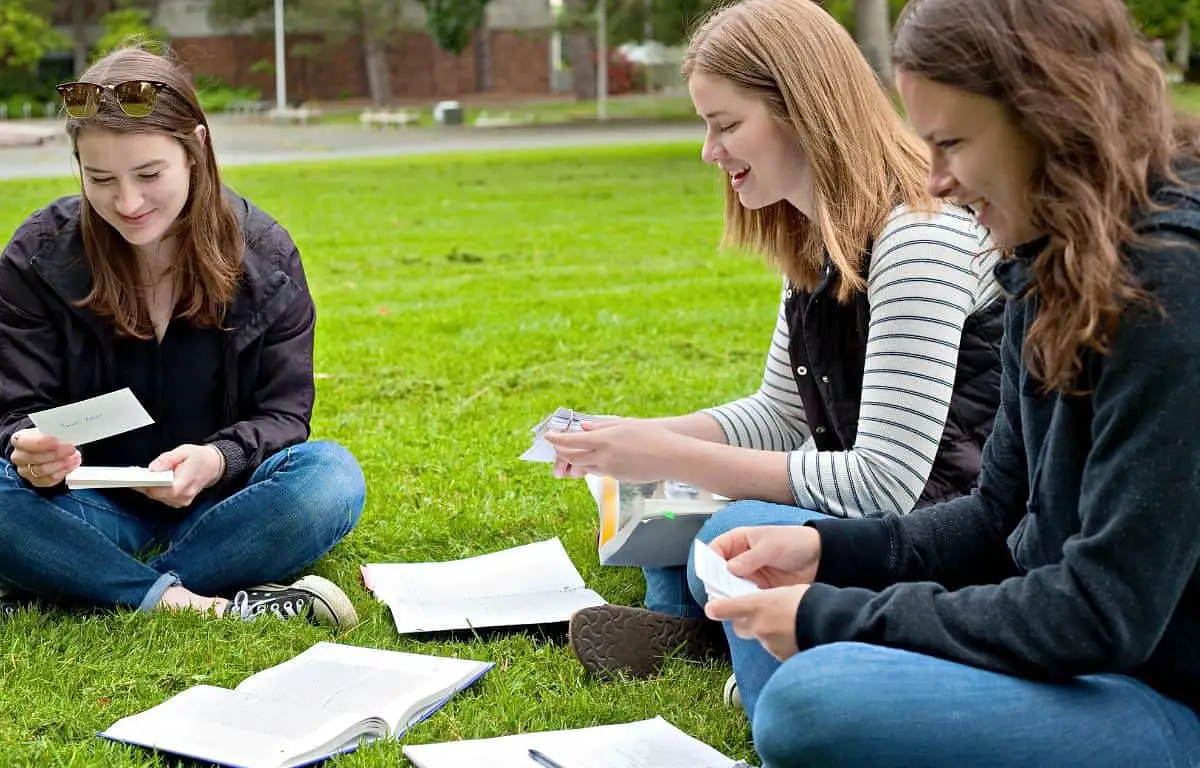Do you find yourself constantly struggling to remember the details of lectures?
Or worse still, forgetting what you've studied for an exam?
Whether you're in your first year or taking finals, keeping up with the demands of university coursework can be really challenging!
As an ex-uni student, I've experienced these struggles and after experimenting for 3 years with effective retrieval practices. I've found that its crucial to find effective study methods that will help you retain information if you want to ace your study goals and spend fewer hours studying!
Active recall is possibly one of the most effective methods for improving your memory. But how do Flashcards fit in? Are they better at making sure you understand your studies?
As an ex-student, I understand exactly what you’re going through! So in my helpful blog post, I’ll explore both sides of the story and discover the real answer.
This post is all about active recall vs flashcards.

ACTIVE RECALL VS FLASHCARDS
The main difference between flashcards and active recall is how you use them to recall information. Active recall can be more challenging but is often more effective in retaining information long-term. Flash cards are great for memorisation and quick review, but may not be as effective for understanding complex concepts.
So with the short answer in place, let’s begin by finding out more about this impressive-sounding proven study method.
Active recall: what is it?

Active recall is a active learning technique that involves actively pulling information from your memory banks instead of just looking over your work.
Re-reading material instead only reinforces the memory of what you already know. So to get started with active recall you essential need to generate information from memory.
This means you are more likely able to retrieve the info from your brain in the future when you need it for a rest or an exam!
Active recall is part of a study approach known as ‘the testing effect’ or ‘retrieval practice’.
And as we all know, the learning process of testing yourself using practice tests helps you to learn and retain information better.
So how does this type of practice help Uni students smash study goals?
Read on to discover more.
Related Article: Active Recall vs Rereading: Which Study Technique is Better?
How does active recall work and why
The best way of understanding how active recall works is that it strengthens the neural pathways in the brain that connect to the information you need to pull.
You are essentially signalling to the brain that the information is important and should be remembered. So, that important information gets put in your long-term memory; leading to deep understanding.
Think of it like a workout for the brain! The same as your body needs exercise to keep in tip-top shape, it’s no surprise to learn your brain does too!
Practising active recall strengthens those crucial neural connections and improves memory recall over time.
Why does it work?
Active recall is proven to be an effective technique for learning and retaining information.
Many studies have shown that active recall helps increase information retention long-term. A study by Karpicke and Loeger is usually the most cited.
So in a nutshell, when you use active recall study techniques you’re not simply memorising new information, you are actually learning it!
By strengthening your ability to retrieve information, you are practising a more active and meaningful way of learning.
So let’s find out below some of my best hacks for using active recall.
Successful Active Recall hacks
Here are some tips to make the most out of active recall
- Don’t cheat: literally, please don’t!! Don’t look at the answer before you’ve attempted to answer the question.
- Use different study strategies: Don't rely on just one method of active recall. Mix it up and use different ways to study, for example, note-taking or blurting etc.,
- Stagger your study sessions: It’s harder to retain large amounts of information if you try to cram everything in at the last minute. So similar to other good techniques, try to space out your learning into manageable chunks.
- Have a break!: give yourself time to rest and recharge between study sessions.
Related Article: Active Recall vs Blurting: Best Study Method for Revision
What are flash cards and why should you use them?

So we are all probably familiar with flashcards, from nursery school onward!
They have become a popular study tool because they are easy to create and super customisable to fit the varying needs of students.
Flashcards are simple and super portable study aids that usually have a question or statement on one side and the corresponding answer on the other side of the flashcard.
They are often made from index cards or small pieces of paper and card. However, you can use a flashcard app to make your own flashcards in your own words, or use there online question banks to find practice questions you can use to test yourself at frequent intervals. Check out Quizlet or Cram.
Flash cards can be used for a wealth of reasons and different subjects, for example, they are excellent for remembering vocabulary words or most important concepts, and dates.
“Flash cards can be used for a wealth of reasons and different subjects.”
Flashcards: Why should you use them?
So although they seem a really simple way of studying The use of flashcards is actually backed by scientific evidence as a proven study method.
The reason for this is that it requires repetition and active engagement with the study materials.
It’s not surprising as when you use them to help level up your study goals as they engage both your visual and verbal memory, so digital flashcards are even better for visual learners.
They are also useful by flash allowing you to monitor your progress by tracking what you already know and crucially, what you need to work on.
You may find them a perfect study tool if you struggle to stay focused or maybe have a short attention span!
How to use flashcards effectively?

- Flash cards can be used in many ways. Some of the most common are practising verbal recitation, self-quizzing, or even comparing answers with your friends!
- It's also a good idea to create your flashcards early on in your course and to keep them updated as you learn about each new concept.
- Don’t forget to shuffle the cards to challenge your memory retention
- To get the best out of using flashcards it's important to keep them organized. ( I’m sure that goes without saying!)
- They work well when categorized by subject, topic, chapter or unit.
- Keep a steady pace while using flashcards, giving yourself time to completely learn the learning material.
Ok so now we’ve taken a look at active recall and Flashcards so you might be wondering how they sit head to head.
Related Article: Effective Time Management Strategies for Students: 15 Proven Tips
Let’s find out.
Are Flashcards and active recall the same?
So to jump straight in, the main difference between flashcards and active recall is how you use them to remember information.
Passive learning or active study
It’s worth understanding that Flash cards are a passive study technique, while it does involve practice testing yourself on specific questions, you are basically reading the card and try to remember the information.
As opposed to Active recall, on the other hand, is an active study technique ( the clue is in the title!) where you try to recall information from your memory without any cues.
Prompts: Active recall Vs Flashcards
With flashcards, you are given a prompt/ visual aids that helps you to recall information.
This is different to active recall. Using this method you will be generating the prompt yourself.
How flashcards build memory Vs active recall
So when thinking about how these two study methods work, Flashcards allow you to memorise information quickly and easily, due to the quick prompt we read about above.
It’s a great way of memorising a large number of facts or chunks of information.
Active recall, on the other hand, forces your brain to work harder to remember information as you don't have that specific prompt to help you remember.
Active recall works really well for long term memory storage and also proving your overall understanding of any topic.
Portability: Flashcards Vs active recall
One of the real benefits of using flashcards is that you can use them anywhere and anytime!
You can take them with you on the train or on the bus, or even on a lunch break.
I suppose we could say that active recall isn’t quite as portable as it requires you to make some notes using pen and paper! But to be fair, they are both fairly comparable when it comes to portability.
Related Articles: 12 Awesome Ways To Take Study Notes When Reading
Which is best: Flashcards or active recall?
So although both flash cards and active recall help students retain information, they each do use different learning styles.
If you are the type of person who prefers to learn facts and information by memorisation, then you may find that flashcards might work better for you.
If you prefer to understand the concepts better and have long-term retention, your go-to study technique will most likely be active recall.
It goes without saying students can also experiment with each of the techniques and find out which works best.
Final thoughts on Active Recall Vs Flashcards

So as we’ve discovered there is no correct answer, each of these methods has its benefits and drawbacks so make sure you think about which one will work best for your particular study session.
Plus personal preference plays a part too. Some students find active recall works better for them, while others can't live without their trusty notecards! Even though I personally find active recall to the best study technique, I used a combination of both active recall and flashcards to study, for my own peace of mind.
Ultimately, it's up to you and what works best for your learning style.
For more support, study hints and all things student, head over to my blog for help, hacks and ways to smash your student goals!








